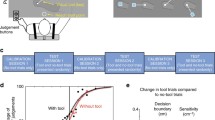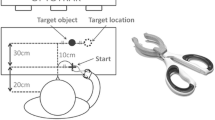Abstract
A well-known phenomenon for the study of movement planning is the end-state comfort (ESC) effect: When they reach and grasp tools, individuals tend to adopt uncomfortable initial hand postures if that allows a subsequent comfortable final posture. In the context of tool use, this effect is modulated by tool orientation, task goal, and cooperation. However, the cognitive bases of the ESC effect remain unclear. The goal of this study was to determine the contribution of semantic tool knowledge and technical reasoning to movement planning, by testing whether the ESC effect typically observed with familiar tools would also be observed with novel tools. Twenty-six participants were asked to reach and grasp familiar and novel tools under varying conditions (i.e., tool’s handle downward vs. upward; tool transport vs. use; solo vs. cooperation). In our findings, the effects of tool orientation, task goal and cooperation were replicated with novel tools. It follows that semantic tool knowledge is not critical for the ESC effect to occur. In fact, we found an “habitual” effect: Participant adopted uncomfortable grips with familiar tools even when it was not necessary (i.e., to transport them), probably because of the interference of habitual movement programming with actual movement programming. A cognitive view of movement planning is proposed, according to which goal comprehension (1) may rely on semantic tool knowledge, technical reasoning, and/or social skills, (2) defines end-state configuration, which in turn (3) calibrates beginning-state comfort and hence the occurrence of the ESC effect.





Similar content being viewed by others
Data availability statement
The datasets generated during and/or analysed during the current study are available from the corresponding author on reasonable request.
References
Adamson RE (1952) Functional fixedness as related to problem solving: a repetition of three experiments. Problem Solving 4
Baumard J, Osiurak F, Lesourd M, Le Gall D (2014) Tool use disorders after left brain damage. Front Psychol. https://doi.org/10.3389/fpsyg.2014.00473
Baumard J, Lesourd M, Jarry C, Merck C, Etcharry-Bouyx F, Chauviré V, Belliard S, Moreaud O, Croisile B, Osiurak F, Le Gall D (2016) Tool use disorders in neurodegenerative diseases : Roles of semantic memory and technical reasoning. Cortex 82:119–132. https://doi.org/10.1016/j.cortex.2016.06.007
Bozeat S, Lambon Ralph MAL, Patterson K, Hodges JR (2002) When objects lose their meaning : What happens to their use? Cognit Affect Behav Neurosci 2(3):3. https://doi.org/10.3758/CABN.2.3.236
Buchmann I, Randerath J (2017) Selection and application of familiar and novel tools in patients with left and right hemispheric stroke: psychometrics and normative data. Cortex 94:49–62. https://doi.org/10.1016/j.cortex.2017.06.001
Buxbaum LJ (2017) Learning, remembering, and predicting how to use tools: distributed neurocognitive mechanisms: Comment on Osiurak and Badets (2016). Psychol Rev 124(3):346–360. https://doi.org/10.1037/rev0000051
Buxbaum LJ, Kalénine S (2010) Action knowledge, visuomotor activation, and embodiment in the two action systems. Ann N Y Acad Sci 1191(1):1. https://doi.org/10.1111/j.1749-6632.2010.05447.x
Chapman KM, Weiss DJ, Rosenbaum DA (2010) Evolutionary roots of motor planning : The end-state comfort effect in lemurs. J Comp Psychol 124(2):229–232. https://doi.org/10.1037/a0018025
Cisek P, Kalaska JF (2010) Neural mechanisms for interacting with a world full of action choices. Annu Rev Neurosci 33(1):269–298. https://doi.org/10.1146/annurev.neuro.051508.135409
Cisek P (2007) Cortical mechanisms of action selection: the affordance competition hypothesis. 15
Cohen RG, Rosenbaum DA (2004) Where grasps are made reveals how grasps are planned : Generation and recall of motor plans. Exp Brain Res. https://doi.org/10.1007/s00221-004-1862-9
Creem SH, Proffitt DR (2001) Grasping objects by their handles: a necessary interaction between cognition and action. J Exp Psychol Hum Percept Perform 27(1):218–228. https://doi.org/10.1037/0096-1523.27.1.218
Dignath, D., & Eder, A. B. (2013). Recall of observed actions modulates the end‑state comfort effect just like recall of one’s own actions. Exp Brain Res, 9.
Dötsch D, Schubö A (2015) Social categorization and cooperation in motor joint action: Evidence for a joint end-state comfort. Exp Brain Res 233(8):2323–2334. https://doi.org/10.1007/s00221-015-4301-1
Dötsch D, Kurz J, Helm F, Hegele M, Munzert J, Schubö A (2021) End in view: Joint end-state comfort depends on gaze and extraversion. Hum Move Sci 80:102867. https://doi.org/10.1016/j.humov.2021.102867
Duncker, K. (1945). On problem-solving. (L. S. Lees, Trad.). Psychol Monogr 58(5), i‑113. https://doi.org/10.1037/h0093599
Gergely G, Csibra G (2003) Teleological reasoning in infancy: the naı̈ve theory of rational action. Trends Cogn Sci 7(7):287–292. https://doi.org/10.1016/S1364-6613(03)00128-1
Goldenberg G (2003) Apraxia and Beyond: Life and Work of Hugo Liepmann. Cortex 39(3):3. https://doi.org/10.1016/S0010-9452(08)70261-2
Goldenberg G (2009) Apraxia and the parietal lobes. Neuropsychologia 47(6):6. https://doi.org/10.1016/j.neuropsychologia.2008.07.014
Goldenberg G, Hagmann S (1998) Tool use and mechanical problem solving in apraxia. Neuropsychologia 36(7):7. https://doi.org/10.1016/S0028-3932(97)00165-6
Goldenberg G, Spatt J (2009) The neural basis of tool use. Brain 132(6):6. https://doi.org/10.1093/brain/awp080
Gonzalez DA (2011) Extending end-state comfort effect: Do we consider the beginning state comfort of another? Acta Psychol 7
Grafton ST, de C. Hamilton, A. F. (2007) Evidence for a distributed hierarchy of action representation in the brain. Hum Mov Sci 26(4):4. https://doi.org/10.1016/j.humov.2007.05.009
Hartmann K, Goldenberg G, Daumüller M, Hermsdörfer J (2005) It takes the whole brain to make a cup of coffee: the neuropsychology of naturalistic actions involving technical devices. Neuropsychologia 43(4):4. https://doi.org/10.1016/j.neuropsychologia.2004.07.015
Herbort O, Butz MV (2011) Habitual and goal-directed factors in (everyday) object handling. Exp Brain Res 213(4):371–382. https://doi.org/10.1007/s00221-011-2787-8
Herbort O, Koning A, van Uem J, Meulenbroek GJ, R. (2012) The end-state comfort effect facilitates joint action. Acta Physiol (oxf) 139(3):404–416. https://doi.org/10.1016/j.actpsy.2012.01.001
Herbort O, Kirsch W, Kunde W (2019) Grasp planning for object manipulation without simulation of the object manipulation action. J Exp Psychol Hum Percept Perform 45(2):237–254. https://doi.org/10.1037/xhp0000602
Hodges JR (2000) The role of conceptual knowledge in object use Evidence from semantic dementia. Brain 123(9):9. https://doi.org/10.1093/brain/123.9.1913
Hodges JR, Spatt J, Patterson K (1999) « What » and « how »: Evidence for the dissociation of object knowledge and mechanical problem-solving skills in the human brain. Proc Natl Acad Sci 96(16):16. https://doi.org/10.1073/pnas.96.16.9444
Hommel B, Colzato LS (2009) How social are task representations? 20(7):5
Jarry C, Osiurak F, Delafuys D, Chauviré V, Etcharry-Bouyx F, Le Gall D (2013) Apraxia of tool use: more evidence for the technical reasoning hypothesis. Cortex 49(9):9. https://doi.org/10.1016/j.cortex.2013.02.011
Jovanovic B, Filk J, Schwarzer G (2022) The influence of tool use experience on efficient grasping in children. Eur J Dev Psychol 19(4):616–631. https://doi.org/10.1080/17405629.2021.1947232
Lesourd M, Servant M, Baumard J, Reynaud E, Ecochard C, Medjaoui FT, Bartolo A, Osiurak F (2021) Semantic and action tool knowledge in the brain: Identifying common and distinct networks. Neuropsychologia 159:107918. https://doi.org/10.1016/j.neuropsychologia.2021.107918
Logan SW, Fischman MG (2015) The death of recency : Relationship between end-state comfort and serial position effects in serial recall: Logan and Fischman (2011) revisited. Hum Mov Sci 44:11–21. https://doi.org/10.1016/j.humov.2015.08.003
Löhr-Limpens M, Göhringer F, Schenk T (2022) Dual-task interference in action programming and action planning—Evidence from the end-state comfort effect. Acta Physiol (oxf) 228:103637. https://doi.org/10.1016/j.actpsy.2022.103637
Meyer M, van der Wel RPRD, Hunnius S (2013) Higher-order action planning for individual and joint object manipulations. Exp Brain Res 225(4):579–588. https://doi.org/10.1007/s00221-012-3398-8
Modersitzki R, Studenka BE (2020) The influence of time constraints on posture choices during an end-state comfort task. Hum Move Sci 71:102618. https://doi.org/10.1016/j.humov.2020.102618
Munoz-Rubke F, Olson D, Will R, James KH (2018) Functional fixedness in tool use: learning modality, limitations and individual differences. Acta Physiol (oxf) 190:11–26. https://doi.org/10.1016/j.actpsy.2018.06.006
Ochipa C, Rothi LJG, Heilman KM (1992) Conceptual apraxia in Alzheimer’s disease. Brain 115(4):4. https://doi.org/10.1093/brain/115.4.1061
Osiurak F, Badets A (2017) Use of tools and misuse of embodied cognition : Reply to Buxbaum (2017). Psychol Rev 124(3):361–368. https://doi.org/10.1037/rev0000065
Osiurak F, Aubin G, Allain P, Jarry C, Etcharry-Bouyx F, Richard I, Le Gall D (2008) Different constraints on grip selection in brain-damaged patients : Object use versus object transport. Neuropsychologia 46(9):2431–2434. https://doi.org/10.1016/j.neuropsychologia.2008.03.018
Osiurak, F., & Reynaud, E. (2020). The elephant in the room : What matters cognitively in cumulative technological culture. Behavioral and Brain Sciences, 43, e156. https://doi.org/10.1017/S0140525X19003236
Osiurak, F., Jarry, C., & Le Gall, D. (2010). Grasping the affordances, understanding the reasoning : Toward a dialectical theory of human tool use. Psychological Review, 117(2), Article 2. https://doi.org/10.1037/a0019004
Osiurak, F., Jarry, C., & Le Gall, D. (2011). Re-examining the gesture engram hypothesis. New perspectives on apraxia of tool use. Neuropsychologia, 49(3), 299‑312. https://doi.org/10.1016/j.neuropsychologia.2010.12.041
Osiurak, F. (2014). What neuropsychology tells us about human tool use? The four constraints theory (4CT): mechanics, space, time, and effort. Neuropsychol Rev
Randerath J, Li Y, Goldenberg G, Hermsdörfer J (2009) Grasping tools : Effects of task and apraxia. Neuropsychologia 47:9
Randerath, J. (2011). From pantomime to actual use : How affordances can facilitate actual tool-use. 7.
Ray M, Welsh TN (2011) Response Selection During a Joint Action Task. J Mot Behav 43(4):329–332. https://doi.org/10.1080/00222895.2011.592871
Reynaud E, Lesourd M, Navarro J, Osiurak F (2016) On the neurocognitive origins of human tool use : A critical review of neuroimaging data. Neurosci Biobehav Rev 64:421–437. https://doi.org/10.1016/j.neubiorev.2016.03.009
Rosenbaum DA, Jorgensen MJ (1992) Planning macroscopic aspects of manual control. Hum Mov Sci 11(1–2):61–69. https://doi.org/10.1016/0167-9457(92)90050-L
Rosenbaum DA, Vaughan J, Barnes HJ, Jorgensen MJ (1992) Time course of movement planning : Selection of handgrips for object manipulation. J Exp Psychol Learn Mem Cogn 18(5):1058–1073. https://doi.org/10.1037/0278-7393.18.5.1058
Rosenbaum DA, van Heugten CM, Caldwell GE (1996) From cognition to biomechanics and back : The end-state comfort effect and the middle-is-faster effect. Acta Physiol (oxf) 94(1):59–85. https://doi.org/10.1016/0001-6918(95)00062-3
Rosenbaum DA, Chapman KM, Weigelt M, Weiss DJ, van der Wel R (2012) Cognition, action, and object manipulation. Psychol Bull 138(5):924–946. https://doi.org/10.1037/a0027839
Rosenbaum, D. A., Marchk, F., Barnes, H. J., Vaughan, J., Slotta, J. D., & Jorgensen, M. J. (1990). Constraints for action selection : Overhand versus underhand grips. In Attention and performance XIII (p. 321‑342). Psychology Press.
Roy, E. A., & Square, P. A. (1985). Common Considerations In The Study of Limb, Verbal And Oral Apraxia. In Advances in Psychology (Vol. 23, p. 111‑161). Elsevier. https://doi.org/10.1016/S0166-4115(08)61139-5
Scharoun SM, Robinson LE, Logan SW, Bryden PJ, Brock SJ, Fischman MG (2018) Sex differences in the end-state comfort effect in pre-adolescent children. Hum Mov Sci 57:244–250. https://doi.org/10.1016/j.humov.2017.09.001
Schmidt RC (2007) Scaffolds for Social Meaning. Ecol Psychol 19:137–151
Short MW, Cauraugh JH (1999) Precision hypothesis and the end-state comfort effect. Acta Physiol (oxf) 100(3):243–252. https://doi.org/10.1016/S0001-6918(98)00020-1
Stamenova, V., Black, S. E., & Roy, E. A. (2012). An update on the Conceptual–Production Systems model of apraxia : Evidence from stroke. Brain and Cognition, 80(1), Article 1. https://doi.org/10.1016/j.bandc.2012.03.009
Vaesen K (2012) The cognitive bases of human tool use. Behavioral and Brain Sciences 35:203–262
Weigelt M, Kunde W, Prinz W (2006) End-State Comfort in Bimanual Object Manipulation. Exp Psychol 53(2):143–148. https://doi.org/10.1027/1618-3169.53.2.143
Wolpert DM, Ghahramani Z (2000) Computational principles of movement neuroscience. Nat Neurosci 3(S11):1212–1217. https://doi.org/10.1038/81497
Funding
This work was supported by grants from Region Normandie (“PEREMO” Project) and from the University of Rouen Normandie (UNIROUEN, ED 556 HSRT, RIN Doctorant 2020 100%).
Author information
Authors and Affiliations
Corresponding author
Ethics declarations
Conflict of interest statement
The authors declare no conflict of interest.
Additional information
Communicated by Bill J Yates.
Publisher's Note
Springer Nature remains neutral with regard to jurisdictional claims in published maps and institutional affiliations.
Supplementary Information
Below is the link to the electronic supplementary material.
Rights and permissions
Springer Nature or its licensor (e.g. a society or other partner) holds exclusive rights to this article under a publishing agreement with the author(s) or other rightsholder(s); author self-archiving of the accepted manuscript version of this article is solely governed by the terms of such publishing agreement and applicable law.
About this article
Cite this article
Baumard, J., De Sousa, E., Roy, V. et al. Grip selection without tool knowledge: end-state comfort effect in familiar and novel tool use. Exp Brain Res 241, 1989–2000 (2023). https://doi.org/10.1007/s00221-023-06655-0
Received:
Accepted:
Published:
Issue Date:
DOI: https://doi.org/10.1007/s00221-023-06655-0




